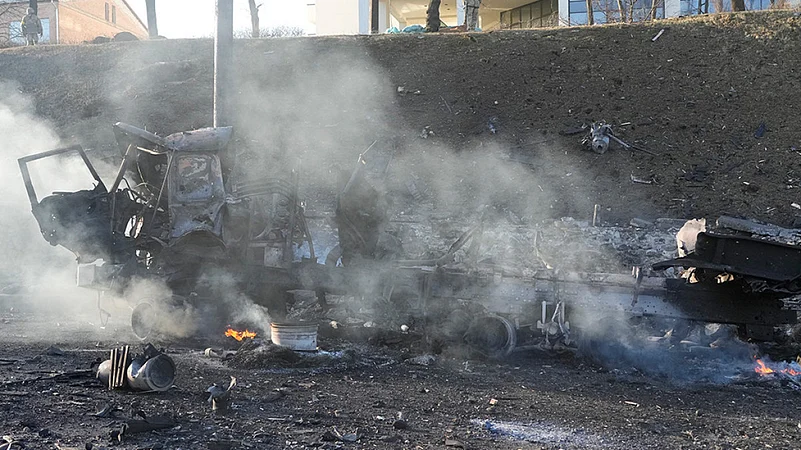From Moscow to Siberia, Russian anti-war activists took to the streets again to protest Russia's invasion of Ukraine, despite the arrests of hundreds of protesters each day by police.
Demonstrators held pickets and marched in city centres on Sunday, chanting "No to war!" as President Vladimir Putin ordered Russian nuclear deterrent to be put on high alert, upping the ante in the Kremlin's standoff with the West and stoking fears of a nuclear war.
"I have two sons and I don't want to give them to that bloody monster. War is a tragedy for all of us," 48-year-old Dmitry Maltsev, who joined the rally in St. Petersburg, told The Associated Press.
Protests against the invasion started on Thursday in Russia and have continued daily ever since, even as Russian police have moved swiftly to crack down on the rallies and detain protesters. The Kremlin has sought to downplay the protests, insisting that a much broader share of Russians support the assault on Ukraine.
But in addition to street protests, tens of thousands of people in recent days have endorsed open letters and signed petitions condemning the invasion. Celebrities and famous TV personalities spoke out against it, too. One online petition, launched hours after Putin announced the attack, has gathered over 9,30,000 signatures in four days, becoming one of the most widely supported petitions in Russia in recent years.
In St. Petersburg, where several hundred gathered in the city centre, police in full riot gear were grabbing one protester after another and dragging some into police vans, even though the demonstration was peaceful. Footage from Moscow showed police throwing several female protesters on the ground before dragging them away.
According to the OVD-Info rights group that tracks political arrests, police detained at least 2,710 Russians in 51 cities for anti-war demonstrations on Sunday, bringing the total of those detained over four days to nearly 6,000.
Four days into the the fighting that has killed scores, Putin raised the stakes dramatically on Sunday, ordering the military Russia's nuclear forces on high alert, citing Western countries "taking unfriendly actions against our country in the economic sphere" and "top officials from leading NATO members made aggressive statements regarding our country."
The day before, the U.S. and its European allies have warned that the coming round of sanctions could include freezing hard currency reserves of Russia's Central Bank and cutting Russia off SWIFT international payment system. The unprecedented move could quickly plunge the Russian economy into chaos.
Ordinary Russians fear that stiff sanctions will deliver a crippling blow to the country's economy. Since Thursday, Russians have been flocking to banks and ATMs to withdraw cash, creating long lines and reporting on social media about ATM machines running out of bills.
According to Russia's Central Bank, on Thursday alone Russians withdrew 111 billion rubles (about USD 1.3 billion) in cash.
The anti-war protests on Sunday appeared smaller and more scattered than the ones that took place on the first day of Russia's attack in Ukraine, when thousands of people rallied in Moscow and St. Petersburg, but their true scale was hard to assess and they seemed to pick up speed as the day went on.
"It is a crime both against Ukraine and Russia. I think it is killing both Ukraine and Russia. I am outraged, I haven't slept for three nights, and I think we must now declare very loudly that we don't want to be killed and don't want Ukraine to be killed," said Olga Mikheeva, who protested in the Siberian city of Irkutsk.
In Moscow and St. Petersburg, many people went to makeshift memorials for Boris Nemtsov, a top Russian opposition figure who was shot dead near the Kremlin on February 27, 2015. Some brought flowers to honour Nemtsov's memory, while others also held banners protesting the invasion of Ukraine, only to be detained minutes after taking them out.
Nemtsov, one of Russia's most charismatic opposition figures, was a staunch advocate against the fighting in eastern Ukraine, where Russia-backed separatists have been battling with Ukrainian forces since 2014 in a drawn-out conflict that has killed more than 14,000.
Russian authorities in recent days have moved to stifle critical voices.
Speaker of Russia's lower house of parliament Vyacheslav Volodin said the anti-war stance of "certain cultural figures" was "inappropriate" and "nothing short of a betrayal of your own people."
Access to Twitter and Facebook has been restricted, and human rights advocates feared similar steps would soon be taken against YouTube.
Russia's state communications and media watchdog Roskomnadzor on Sunday demanded that Google lift restrictions imposed on YouTube channels run by several Russian state media outlets. The Network Freedoms rights group noted that Facebook's refusal to comply with a similar demand this week led to restricted access to the platform.
The website of the Current Time, a Russian TV channel launched by the U.S.-funded Radio Free Europe/Radio Liberty that has been critical of the Kremlin, became unavailable on Sunday after the channel reported receiving a notification from Roskomnadzor about blocking it.
















